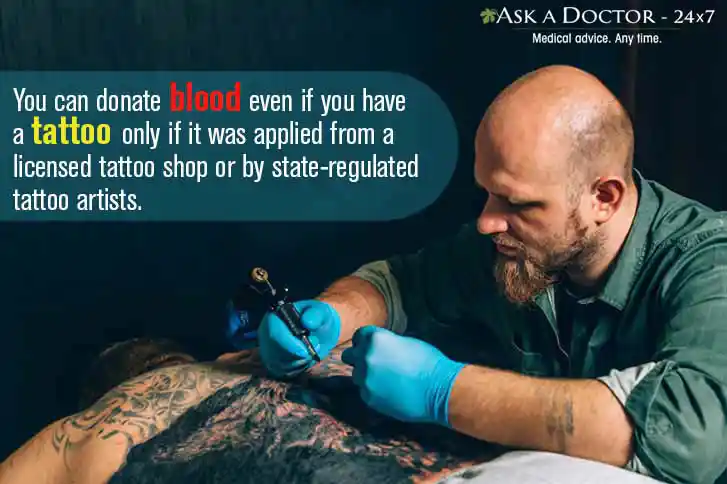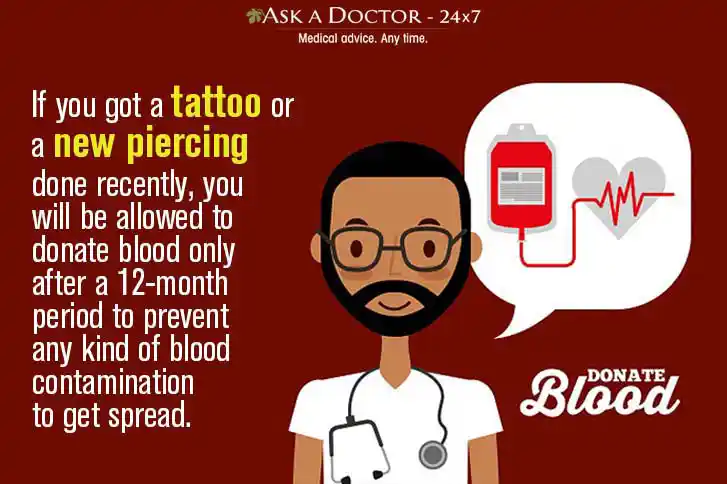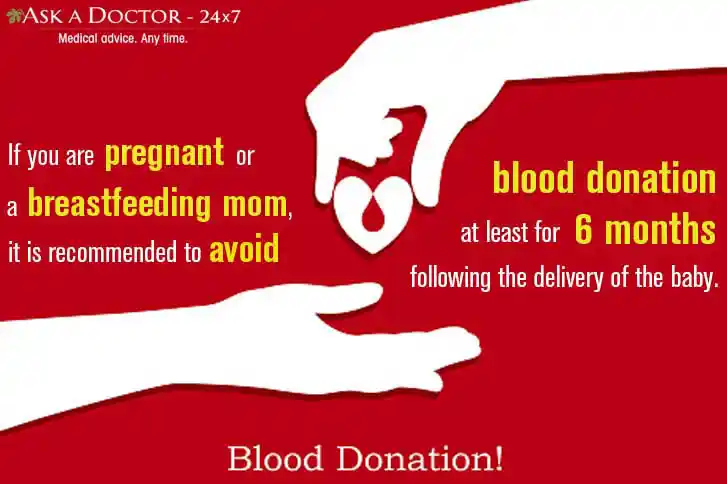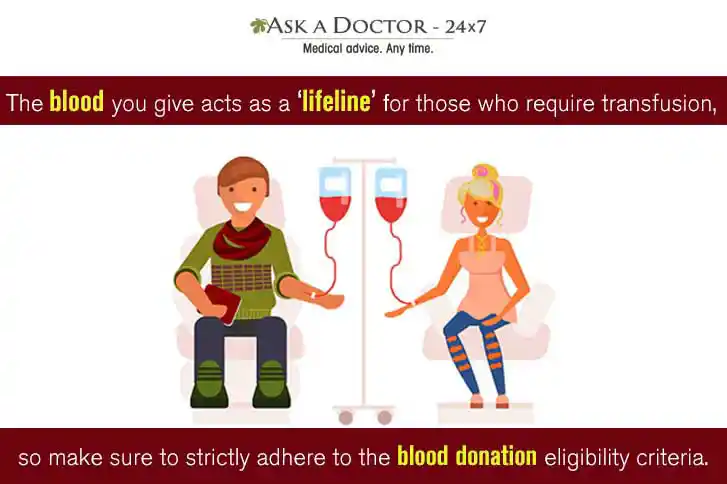Can You Donate Blood If You Have A Tattoo?
Samaira, a 21-year-old confident girl known for her kindness and selfless social acts, was alarmingly taken aback when she was not allowed to donate blood to her own cousin. A tattoo with the message, ŌĆ£Whoever saves a life is human!ŌĆØ that she got done a week ago has actually made her ineligible to donate blood to her cousin who was battling for life. Typically applauded for her helping approach, this left Samaira standing in despair. Unfortunately, she was not aware of the basics of blood donation and body art.
If you get inked or pierced, your ability to donate blood might get affected, at least for a while.
If you get inked or pierced, your ability to donate blood might get affected, at least for a while.
LetŌĆÖs examine how to know if you can donate blood if you have a tattoo

Many people think that once you get a tattoo done, you can never donate blood. However, this is not true. Many rules have changed since tattoo artistry became mainstream. Even if youŌĆÖve had body art done, you can still give blood and remain passionate about your commitment to helping others. You only need to follow some regulatory standards while getting a tattoo.
A tattoo is acceptable in blood donation bank only, if it was applied:
- From a licensed tattoo shop or by state-regulated tattoo artists.
- Using sealed needles and ink that is not reused.
- By an artist who used gloves and washed his/her hands between clients.
Along with the above criteria, one common thumb rule that is followed in most parts of the world is that you cannot donate blood if your tattoo is less than a year old. This norm of keeping a year gap between tattoo making and blood donation is similar to guidelines regarding other body art, like piercing.
Why you canŌĆÖt donate blood for 12 months after getting a new tattoo?

People are not allowed to donate blood for a full year (or in certain states for six months) after getting a new tattoo or piercing because it involves a use of needle and ink, which can introduce foreign material and pathogens into your body and end up contaminating your blood. This can consequently predispose you to chronic diseases such as hepatitis B, hepatitis C, HIV, syphilis, and other common blood-borne ailments.
Although a tattoo done by any licensed artist is much safer, there is still always a chance of getting a disease unknowinglyŌĆöespecially hepatitis. And by any chance, if you happen to contract hepatitis disease from a tattoo, it gets identified in a blood screening only after a 12-month period. This is the reason it is important to take a break of one year from donating blood after you get new body art.
To know more details on how tattoos affect the body, ask a hematologist online. Remember, it is always better to practice safety and protect your health than to take a risk.
Although a tattoo done by any licensed artist is much safer, there is still always a chance of getting a disease unknowinglyŌĆöespecially hepatitis. And by any chance, if you happen to contract hepatitis disease from a tattoo, it gets identified in a blood screening only after a 12-month period. This is the reason it is important to take a break of one year from donating blood after you get new body art.
To know more details on how tattoos affect the body, ask a hematologist online. Remember, it is always better to practice safety and protect your health than to take a risk.
What are the conditions that make you ineligible to donate blood for a lifetime?

Anyone who falls under any of the following conditions is considered ineligible to donate blood for a lifetime.
1. If you are suffering or ever suffered from any of these health conditions:
2. If you have ever taken narcotic drugs by intravenous route (injecting directly in the vein), even once.
3. If you are a commercial sex-worker.
1. If you are suffering or ever suffered from any of these health conditions:
- Hepatitis B and C
- Hemophilia
- Thalassemia
- HIV (AIDS virus)
- Multiple sclerosis
- Myocardial infarction or coronary artery bypass surgery
- Cancer
- Stroke
- Chagas disease
- Ebola virus
- Sickle cell disease
- Any other blood disorder
2. If you have ever taken narcotic drugs by intravenous route (injecting directly in the vein), even once.
3. If you are a commercial sex-worker.
What are the other reasons that affect your eligibility to give blood for a limited period?

You will not be allowed to donate blood for at least three to four months, if you:
Likewise, you cannot donate blood if you are pregnant or are a breastfeeding mom. It is recommended to avoid blood donation at least for six months following the delivery of the baby. Additionally, you will also not be eligible to donate blood if you have consumed alcohol in the last 48 hours or if you have smoked in the last 6 hours.
- Received treatment for Malaria
- Underwent any minor surgery
- Underwent Endoscopy
- Underwent dental procedures and other oral surgery
- Traveled to areas where mosquito-borne infections are endemic
Likewise, you cannot donate blood if you are pregnant or are a breastfeeding mom. It is recommended to avoid blood donation at least for six months following the delivery of the baby. Additionally, you will also not be eligible to donate blood if you have consumed alcohol in the last 48 hours or if you have smoked in the last 6 hours.
Who can donate blood?

You can safely donate blood, if:
1. You are above 17 years of age
2. You hold body weight above 50kg
3. Your blood pressure range is:
4. Your pulse rate is between:
The blood you give acts as a ŌĆślifelineŌĆÖ for those experiencing medical conditions that require transfusions. This is the reason blood banks all across the globe strictly adhere to eligibility criteria before allowing any aspiring donor to go for this noble effort. So it's always a good idea to discuss your circumstances first by talking to an online hematologist before you plan to donate blood.
For more information, contact us today!
1. You are above 17 years of age
2. You hold body weight above 50kg
3. Your blood pressure range is:
- Systolic between 100 to 180 mm Hg
- Diastolic between 50 to 100 mm Hg
4. Your pulse rate is between:
- 50 to 100 mm without any irregularities
The blood you give acts as a ŌĆślifelineŌĆÖ for those experiencing medical conditions that require transfusions. This is the reason blood banks all across the globe strictly adhere to eligibility criteria before allowing any aspiring donor to go for this noble effort. So it's always a good idea to discuss your circumstances first by talking to an online hematologist before you plan to donate blood.
For more information, contact us today!
Ask a Specialist
Recent Questions


